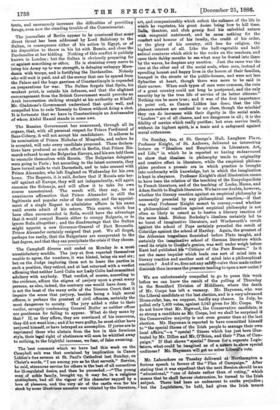On Sunday, too, at St. George's Hall, Langham Pla ce,. Professor
Knight, of St. Andrews, delivered an interesting lecture on "Idealism and Empiricism in Literature, Art,. and Life," in which he is reported as having endeavoured to show that idealism in philosophy tends to originality and creative effort in literature, while the empirical philoso- phies produce a prosaic era in which practice is brought into conformity with knowledge, but in which the imagination is kept in abeyance. Professor Knight's chief illustration seems- to have been the relation of the teaching of the Eucyclopmdists to French literature, and of the teaching of Locke, Hume, and Adam Smith to English literature. We have our doubts, however, whether the literary reaction against an empirical philosophy is necessarily preceded by any philosophical reaction,—if that was what Professor Knight meant to convey,—and. whether a philosophical reaction against empirical philosophy is not often as likely to retard as to hasten a literary reaction of the same kind. Bishop Berkeley's idealism certainly led to no burst of imaginative literature, and Wordsworth's revolt against the school of Pope certainly preceded the revolt of Coleridge against the school of Hartley. Again, the greatest of the Athenian tragedians flourished before Plato taught, and certainly the imaginative school of German literature which owed its origin to Goethe's genius, was well under weigh before Kant had published his "Critique of the Pure Reason." Is it not the same impulse which leads one sort of mind into a literary reaction and another sort of mind into a philosophical reaction ? And if so, does not any safety-valve thus made rather diminish than increase the pressure tending to open a new outlet ?


































 Previous page
Previous page